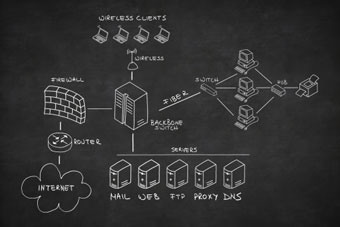To understand what the aftermath of a disaster like Hurricane Sandy can do to a credit union look no further than the $1.8 billion Municipal Credit Union. In the difficult days following the superstorm, MCU members became increasingly frustrated and furious, sharply criticizing the New York credit union for what they said were serious lapses and missteps in its disaster recovery efforts.
While Hurricane Sandy had a major impact on many credit union operations throughout New York's tri-state area, knocking out power to millions and leaving behind unthinkable devastation, disaster recovery experts said the MCU experience is a case study that highlights five major lessons that credit unions should learn from and avoid.
What's more, MCU President/CEO Kam Wong explained what the credit union has learned and what steps it is taking to ensure the disaster recovery issues don't happen again. Wong also said he is sorry about how the post-storm problems affected MCU members.
Lesson 1: Make Direct Deposit a Critical Function
For nearly a week, members received little or no specific information from MCU about why their direct deposits had not been posted, preventing them from paying bills or get cash they needed to buy necessities to ride out the first difficult days of the storm's aftermath.
 As this issue festered in the days after the storm passed Oct. 29, members grew frustrated, anxious, and angry. They vented many of those feelings by leaving more than 70 comments after reading cutimes.com articles that covered the MCU crisis.
As this issue festered in the days after the storm passed Oct. 29, members grew frustrated, anxious, and angry. They vented many of those feelings by leaving more than 70 comments after reading cutimes.com articles that covered the MCU crisis.
“I still haven't gotten my paycheck…I have no money to pay my rent or buy food this weekend,” MCU member Jennifer O. wrote in the comments section in a Nov. 1 cutimes.com article. “I'm desperate and I don't know what to do! I don't know how to call them, the only number is this toll free number which does nothing. HELP!!!!”
This direct deposit debacle caught the attention of Ongoing Operations, a Hagerstown, Md.-based provider for business continuity and disaster recovery solutions for credit unions nationwide.
Robin Reimes, a business continuity consultant at Ongoing Operations, wrote in a recent blog post that many credit unions overlook the direct deposit process because it is highly automated and involves multiple parties. But if credit unions don't recognize direct deposit as a critical process, it won't be addressed in disaster recovery plans.
Reimes pointed out direct deposit becomes critical when a natural disaster occurs at or near the time a major payroll is scheduled for processing. In MCU's case, direct deposits were scheduled to be processed on Oct. 29, Oct. 30 or Oct. 31 when much of New York City was still in the dark. As a result, more than 14,000 MCU members didn't receive their paychecks.
“If your crisis happened on the day a major payroll is scheduled for process, you and your members will feel the pain much faster,” Reimes wrote in her blog. “Additionally, the longer the outage, your credit union stands an increasingly high risk of losing those members.”
Reimes recommended that credit unions pick apart the entire direct deposit process to identify and fix weak spots.
“Engage in conversations that eliminate disruptions – for instance, is it possible to 're-run' their last payroll in the event of a crisis?” wrote Reimes. “Many major payroll providers currently do this for companies – why not credit unions? The key to preparedness is plannin and testing alternative delivery options.”
In response, Wong said the credit union will work with city agencies that provide MCU payroll information to get that payroll information as far in advance as possible, when (weather) forecasts predict impending problems that could impact normal business operations. The majority of MCU members are New York City employees who are paid from their respective city agencies.
“In the case of Hurricane Sandy, at the end of Friday, Oct. 26, no one anticipated New York City ordering a mandatory shutdown of the city beginning Sunday night in advance of the storm, and that the storm would keep most of New York City businesses without power, transportation for as long as it did, so we anticipated operating on a normal business schedule,” Wong said. “We also will encourage city agencies to send us their payroll information via electronic means instead of the manual process they currently use.” Lesson No. 2: Playing the Blame Game Won't Work
MCU blamed its inability to process direct deposits because it did not receive payroll data files from agencies in the city of New York before the superstorm knocked out power. While the power was out, MCU said it was working around the clock to manually process the payroll information to post on members' accounts.
 “My direct deposit is late by three days,” commented Cannon56. “This is unacceptable by MCU!” A comment like this from members is why disaster recovery experts say blaming a problem on someone or something else doesn't work. The No. 1 rule of a good crisis management is to acknowledge the issue quickly, tell members what the credit union is doing to fix it and provide as much information as possible.
“My direct deposit is late by three days,” commented Cannon56. “This is unacceptable by MCU!” A comment like this from members is why disaster recovery experts say blaming a problem on someone or something else doesn't work. The No. 1 rule of a good crisis management is to acknowledge the issue quickly, tell members what the credit union is doing to fix it and provide as much information as possible.
“I think the credit union members probably didn't have all the information, but they are also probably right to be upset. In my opinion, the credit union really missed an opportunity here to shine for their membership,” said Kirk Drake, president/CEO of Ongoing Operations. “Good crisis management processes can really help credit unions communicate proactively and honestly with members, resulting in building trust and brand value. In general, blaming anyone in a disaster probably won't really help the situation and will do more harm than good.”
But Wong insisted that MCU did not blame the entire problem on someone.
“This problem impacted about 14,000 members, and while that is a very small percentage of our close to 300,000 members with direct deposits, we are sorry it impacted even one member,” said Wong. “The difficult challenge for us was that we didn't learn about these missing payrolls until our staff, working at our disaster recovery site manually posting credits to accounts, realized information was missing. We informed our members then, but we do understand the frustration some members felt when an expected deposit was not seen when they checked their balances online.”
Even though MCU had covered these deposits and posted information explaining that the deposits were delayed and why, Wong concedes that MCU should have posted a more comprehensive message with recommendations to members, which was to go to an MCU branch and see the branch manager.
Branch managers were authorized to look up direct deposit histories, and if the expected last one was not credited due to the storm, MCU was honoring those deposits and honoring withdrawals of up to $800 a day even though the credit couldn't confirm that money was in members' accounts, Wong said. Lesson No. 3: Backup Systems CUs Must Have: Phone, Email and Website
The three most important services all credit unions must have in a disaster recovery plan is to absolutely, positively have backup technology that will ensure the credit union's email, phone and website keep working.
 “If you don't have these three, your members have no idea how to get a hold of your credit union any other way and they cannot get information,” Drake said.
“If you don't have these three, your members have no idea how to get a hold of your credit union any other way and they cannot get information,” Drake said.
What drove up concern and anxiety among MCU members is that they could not call their credit union to find out what was happening or get any updates. Without power, MCU said it could not operate its call center for nearly a week.
The credit union did establish another number for members to call. However, members complained the number connected only to a recording of branches that were open. Some members managed to contact the branches that had reopened Oct. 31, but some complained they didn't get any answers. Members also complained they sent MCU emails that were not answered.
“I can't reach MCU over the phone because they have no one answering,” wrote another MCU member, “Pissed Off.” “I've no food or money and no one from MCU is letting me know anything.”
So how did some credit unions manage to stay operating despite the superstorm devastation?
For the credit unions that already were prepared, with solid plans in place, everything was relatively calm, Scott Collins, president of Grand Rapids, Mich.-based CUSO Xtend Inc., said in a Nov. 14th Credit Union Times article. Xtend provides disaster recovery services to five New York City-based credit unions and one in New Jersey. “None of our credit unions lost a minute of uptime on electronic channels,” said Collins, who acknowledged they all had limited or no branch services, primarily due to lack of power.
For one credit union, Progressive Credit Union, the $540 million Manhattan institution known for its portfolio of taxi medallion loans, “we provided phone answering services,” said Collins who indicated Progressive has a contract in place with Xtend where the CUSO, as needed, steps in and answers inbound phone calls with the aim of providing members with questions full and accurate answers.
Even though MCU had a disaster recovery plan in place, Wong said his credit union certainly did learn another lesson from Hurricane Sandy.
“Our biggest challenge was telecommunications. We learned we need to have more than one telecommunications provider,” Wong said. “Although our post-9/11 disaster recovery plan worked, the one thing that was problematic was that we still relied on one provider for our phone and data lines and many telecommunications hubs were damaged due to this unprecedented storm affecting the majority of businesses and homes in our area.
“In the future, we will have two, if not three, providers so that the back up is on a different system and we will have alternatives for customer service lines and data communications. We are already working on this.” Lesson 4: Your Hot Site Should Not Be Within Driving Distance Of Your Headquarters
When 9/11 devastated lower Manhattan – the business and government center of New York City where MCU has its headquarters – many businesses decided to move their disaster recovery hot sites hundreds of miles away.
 “If you look at any major organization that got hit during 9/11, they moved their DR sites to northern Virginia, Charlotte, N.C., or any place not in the New York tri-state area,” said Drake.
“If you look at any major organization that got hit during 9/11, they moved their DR sites to northern Virginia, Charlotte, N.C., or any place not in the New York tri-state area,” said Drake.
After 9/11, MCU moved its DR site from Malvern, PA., (outside Philadelphia) to Carteret, N.J., which is about 22 miles from MCU's headquarters, or about a 35-minute drive. New Jersey suffered the brunt of Hurricane Sandy's destruction as well as widespread power outages.
“My gut tells me is that MCU desperately needs to update their disaster recovery planning,” said Karen Jaworski, senior director of product marketing for EVault Inc. in San Francisco, a provider of backup and recovery services. “They continue to go at disaster recovery planning with a 20th century methodology, which is not right for today.”
You'll get no argument about that from MCU member, Yazeem Collazo, who wrote: “NY MCU is antiquated and should have learned from 9/11 that contingency plans are ESSENTIAL in a crisis situation – especially when you're responsible for millions of dollars.”
Jaworski explained that many businesses developed their disaster recovery plans in part on the generally accepted best practice of locating backup servers far away enough from a company's main servers to avoid simultaneous loss, but not too far away for timely disaster recovery. But because superstorms like Hurricane Sandy can envelope entire regions of the country, having backup servers within driving distance may no longer be a good disaster recovery practice.
“Sandy is the biggest storm we've seen, and it's probably not going to be an isolated incident,” said Jaworski. What's more, it may be difficult to corral enough employees to work on disaster recovery efforts when they and their families, too, have been impacted by a storm.
That's why more businesses are considering cloud computing and virtualization solutions that remove the need for companies to maintain backup servers or other hardware, said Jaworski.
Virtualization makes it very easy to back up information remotely through virtual private networks, said Jaworski. When virtualization is combined with cloud computing, it enables companies to move data far enough away from harm's way.
“Your data does not have to be within a driving distance anymore,” Jaworski said. “It could be all the way on the other side of the country or in another country if that is what you wanted to do.”
However, Wong said MCU's disaster recovery site was not the problem; it was, instead, the telecommunications system.
“Our disaster recovery site, which is the same one used by the U.S. Army and many Fortune 500 companies, was safe and functional; we had staff working at the site the day after the hurricane hit, so in this instance, the location of our site did not impact our recovery efforts,” Wong said. “Our problem was in the telecommunications, which meant our staff at the disaster recovery site had to manually put in all the information that had been backed up on the servers in our disaster recovery site, and it also meant that our customer service phone lines were down. But we intend to assess every part our disaster recovery plan and response to determine ways we can do things better. You always learn from every new situation and we will learn and improve from this one. Lesson 5: Communicate…..Communicate…. and Communicate some more
Frustrated over not getting enough information about what was happening with their credit union, some MCU members searched on Google and found the cutimes.com articles.
 “MCU communications with its customers affected by this should be updated more frequently than it has been,” reads one comment by Silntdrgn 7. “I and many others have to search all over the Internet just to get updates and find out what happened. If it (wasn't) for the reports here, many of us wouldn't know anything. How about at least using the CUT to update members every few hours on where things stand?”
“MCU communications with its customers affected by this should be updated more frequently than it has been,” reads one comment by Silntdrgn 7. “I and many others have to search all over the Internet just to get updates and find out what happened. If it (wasn't) for the reports here, many of us wouldn't know anything. How about at least using the CUT to update members every few hours on where things stand?”
On a phone line set up after the superstorm, a recorded message told members which branches were open. Three days after the storm, Wong posted a letter to members on the credit union's website.
In that letter, Wong expressed empathy for members and their families, offered member assistance such as emergency credit line increases, and said employees were working around the clock to reopen closed branches. However, he did not mention the direct deposit problem even though MCU members had already publicly posted complaints on cutimes.com about the direct deposit issue, inoperable ATMS and no access to MCU's call center.
Wong did acknowledge the direct deposit issue in his second letter to members Nov. 6. By then, however, power had been fully restored in lower Manhattan, enabling MCU to process the payrolls. However, sometime before Wong's second letter, MCU did post a notice on its site about the direct deposit problem and that it was working to fix it.
Nonetheless, many members said they were upset because they received no emails or texts messages. What's more, because MCU doesn't have a Twitter or Facebook site, it wasn't able to leverage the popular social media channels to communicate with members as other credit unions did throughout the tri-state area.
“You have to regularly and proactively provide as much information as you can,” said Drake. “The quicker you can get information out there, the less things fester and become ugly. When you do that you build trust in that environment.”
Wong said he is sorry that members felt they did not have the information they needed and he pledged to work to better communicate news in the future.
“We put information on our website and we ran full-page ads in local newspapers this time, but we will look to do even more in the future, providing more frequent updates and also using as many communications vehicles as viable,” said Wong.
Next Steps:
© Touchpoint Markets, All Rights Reserved. Request academic re-use from www.copyright.com. All other uses, submit a request to [email protected]. For more inforrmation visit Asset & Logo Licensing.







